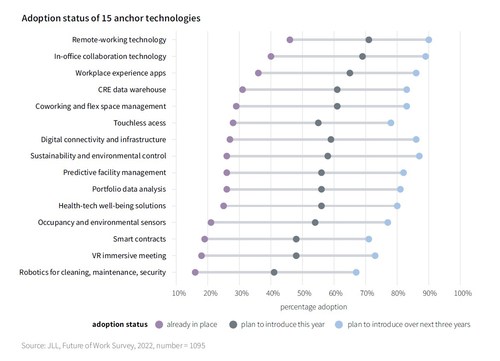JLL research reveals that companies focused on return to work must implement customizable technologies to build effective hybrid working models
As businesses adapt to hybrid work this fall and beyond, JLL’s (NYSE: JLL) Technology and Innovation in the Hybrid Age report finds that tech-enabled solutions are crucial to the success of the hybrid work model. The research shows that there is no one-size-fits-all solution and organizations will need to implement tailored tools and processes that work for their employees, clients and business models.

“Hybrid work looks different for every business given the uniqueness of their employee base and business model, and where they are with regard to return to work,” said Sharad Rastogi, President, JLL Technologies. “While the office remains a cornerstone of operations, identifying and adopting the right technologies so employees can seamlessly work in the office, at home or elsewhere is essential to the success of the hybrid work model.”
Companies have started to adopt technology, but it’s still in early stages
Several technologies are considered essential for executing hybrid work, but JLL’s research found that while there is an ambition to adopt these technologies across companies, there’s a large gap between future plans and current implementation.
Top technologies in service of hybrid work that are currently in place across companies surveyed include remote working technology (47%), in-office collaboration technology (40%) and workplace experience apps (36%). Companies plan to adopt solutions like sustainability and environment controls (60%), digital infrastructure and connectivity (58%) and occupancy and environment sensors (56%) over the next three years.
With 55% of office-based employees now in a hybrid work pattern, companies must increase the rate of technology adoption to meet workforce preferences and business goals.
Technology adoption is pivoting from reactive to forward-looking implementation
On average, companies have adopted only four out of the 15 anchor technologies necessary for the hybrid work transformation, but many have significant ambitions. By 2025, 78% plan to incorporate the majority of these technologies into their portfolios and in 2022 alone, most companies aim to adopt up to six new technology solutions. Moreover, to harness the technological expertise needed to identify and implement these solutions, an increasing number of companies are outsourcing. 44% of large organizations are reporting that they are working with external partners to accelerate commercial real estate technology implementation.
With a greater variety of technology solutions available than ever, developing a strategic approach is critical
As organizations navigate their approach to hybrid work, they need to work closely with employees to find the right technology that works best for their business. Companies are now able to select from a greater selection of technology solutions than ever to meet their specific needs.
Additionally, more organizations are recognizing that no single technology offers a magic solution, and they will have to implement specific sets of solutions and related services that take into consideration their current and future needs. Companies that can empower employees and support flexibility with the right technologies and purposefully designed workplaces will succeed in the hybrid working environment.
“Leading edge, innovative companies are establishing strategic approaches for hybrid work to select the right technologies, develop the right capabilities and execute on well-defined implementation roadmaps,” said Rastogi.
Source:https://www.prnewswire.com/





















Add Comment